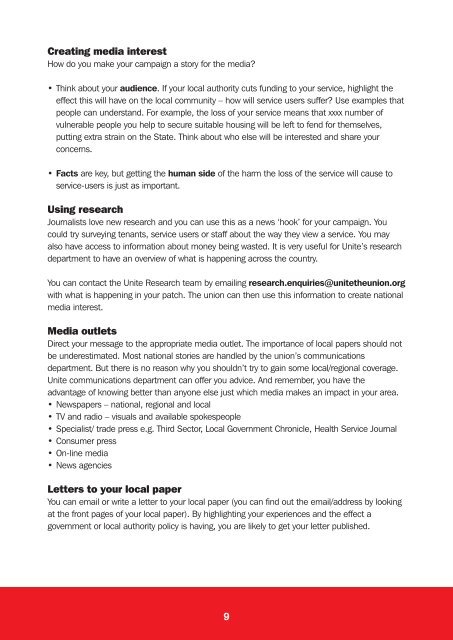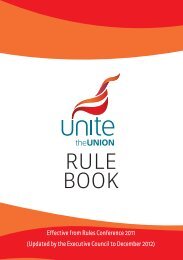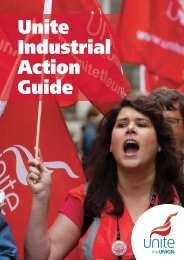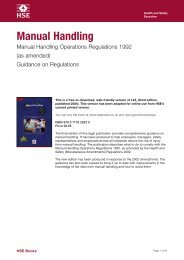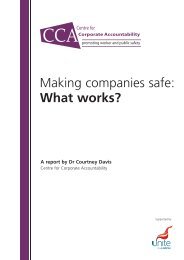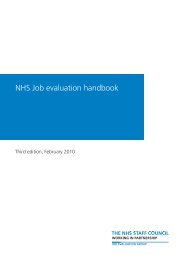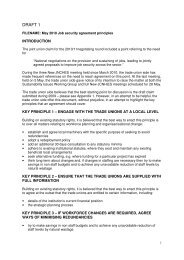Unite guide to campaigning - Unite the Union
Unite guide to campaigning - Unite the Union
Unite guide to campaigning - Unite the Union
You also want an ePaper? Increase the reach of your titles
YUMPU automatically turns print PDFs into web optimized ePapers that Google loves.
Creating media interest<br />
How do you make your campaign a s<strong>to</strong>ry for <strong>the</strong> media?<br />
• Think about your audience. If your local authority cuts funding <strong>to</strong> your service, highlight <strong>the</strong><br />
effect this will have on <strong>the</strong> local community – how will service users suffer? Use examples that<br />
people can understand. For example, <strong>the</strong> loss of your service means that xxxx number of<br />
vulnerable people you help <strong>to</strong> secure suitable housing will be left <strong>to</strong> fend for <strong>the</strong>mselves,<br />
putting extra strain on <strong>the</strong> State. Think about who else will be interested and share your<br />
concerns.<br />
• Facts are key, but getting <strong>the</strong> human side of <strong>the</strong> harm <strong>the</strong> loss of <strong>the</strong> service will cause <strong>to</strong><br />
service-users is just as important.<br />
Using research<br />
Journalists love new research and you can use this as a news ‘hook’ for your campaign. You<br />
could try surveying tenants, service users or staff about <strong>the</strong> way <strong>the</strong>y view a service. You may<br />
also have access <strong>to</strong> information about money being wasted. It is very useful for <strong>Unite</strong>’s research<br />
department <strong>to</strong> have an overview of what is happening across <strong>the</strong> country.<br />
You can contact <strong>the</strong> <strong>Unite</strong> Research team by emailing research.enquiries@unite<strong>the</strong>union.org<br />
with what is happening in your patch. The union can <strong>the</strong>n use this information <strong>to</strong> create national<br />
media interest.<br />
Media outlets<br />
Direct your message <strong>to</strong> <strong>the</strong> appropriate media outlet. The importance of local papers should not<br />
be underestimated. Most national s<strong>to</strong>ries are handled by <strong>the</strong> union’s communications<br />
department. But <strong>the</strong>re is no reason why you shouldn’t try <strong>to</strong> gain some local/regional coverage.<br />
<strong>Unite</strong> communications department can offer you advice. And remember, you have <strong>the</strong><br />
advantage of knowing better than anyone else just which media makes an impact in your area.<br />
• Newspapers – national, regional and local<br />
• TV and radio – visuals and available spokespeople<br />
• Specialist/ trade press e.g. Third Sec<strong>to</strong>r, Local Government Chronicle, Health Service Journal<br />
• Consumer press<br />
• On-line media<br />
• News agencies<br />
Letters <strong>to</strong> your local paper<br />
You can email or write a letter <strong>to</strong> your local paper (you can find out <strong>the</strong> email/address by looking<br />
at <strong>the</strong> front pages of your local paper). By highlighting your experiences and <strong>the</strong> effect a<br />
government or local authority policy is having, you are likely <strong>to</strong> get your letter published.<br />
9


